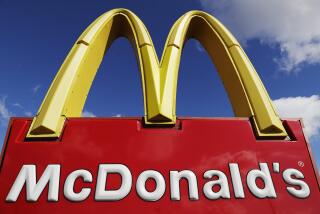Big Mac $6.81 in Switzerland, $1.62 in India, Economist says
- Share via
If an average Big Mac in the U.S. costs $4.20, the $6.81 price tag for the same burger in Switzerland may mean that the Swiss Franc is 62% overvalued, according to an analysis by The Economist.
The publication’s occasional Big Mac Index takes the price of the popular McDonald’s sandwich around the world and uses it to calculate the value of international currencies.
The exercise is based on an economic theory known as purchasing power parity, which holds that exchange rates should balance out over the long run to equal the cost of a basket of goods and services in different countries.
Using a method that’s simple but has been viewed with skepticism since it was first used in 1986, The Economist divides the price of the Big Mac in two countries and compares the result to the currencies’ exchange rate. Critics complain that the formula fails to consider the production and delivery costs, workers’ wages, demand, regional taxes and other factors that vary across nations.
The Big Macs themselves are also different around the world. The Indian Maharaja Mac version, which was the cheapest at $1.62, is made of chicken because many Indians don’t eat beef. According to The Economist, the country’s rupee is 60% undervalued.
Other cheap Big Macs – the $2.11 burger in the Ukraine and the $2.12 sandwich in Hong Kong. In China, the burger costs $2.44.
RELATED:
McDonald’s gets a French makeover
McDonald’s to focus on quality ingredients in ad campaign
McDonald’s income up 9% to $1.5 billion on new menus, modernization
More to Read
Inside the business of entertainment
The Wide Shot brings you news, analysis and insights on everything from streaming wars to production — and what it all means for the future.
You may occasionally receive promotional content from the Los Angeles Times.











